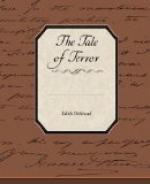Godwin was a pioneer breaking new ground in fiction; and, as he was a man of talent rather than of genius, it is idle to expect perfection of workmanship. The story is full of improbabilities, but they are described in so matter-of-fact a style that we “soberly acquiesce.” After an hour of Godwin’s grave society an effervescent sense of humour subsides. A mind open to suggestion is soon infected by his imperturbable seriousness, which effectually stills “obstinate questionings.” Even the brigands who live with their philanthropic leader are accepted without demur. After all, Raymond is only Robin Hood turned political philosopher. The ingenious resources of Caleb Williams when he strives to elude his pursuer are part of the legitimate stock-in-trade of the hero of a novel of adventure. He is not as other men are, and comes through perilous escapades with miraculous success. It is at first difficult to see why Falkland does not realise that his plan of ceaselessly harassing his victim is likely to force Williams to accuse him publicly, but gradually we begin to regard his mental obliquity as one of the decrees of fate. Falkland’s obtuseness is of the same nature as that of the sleeper who undertakes a voyage to Australia to deliver a letter which anywhere but in a dream would have been dropped in the nearest pillar-box. The obvious solution that would occur to a waking mind is persistently evasive. The plot of Caleb Williams hinges on an improbability, but so does that of King Lear; and if it had not been for Falkland’s stupidity, the story would have ended with the first volume. Godwin excels in the analysis of mental conditions, but fails when he attempts to transmute passionate feeling into words. We are conscious that he is a cold-blooded spectator ab extra striving to describe what he has never felt for himself. It is not even “emotion recollected in tranquillity.” Men of this world, who are carried away by scorn and anger, utter their feelings simply and directly. Godwin’s characters pause to cull their words from dictionaries. Forester’s invective, when he believes that Williams has basely robbed his master is astonishingly elegant: “Vile calumniator! You are the abhorrence of nature, the opprobrium of the human species and the earth can only be freed from an insupportable burthen by your being exterminated."[81] The diction is so elaborately dignified that the contempt which was meant almost to annihilate Caleb Williams, lies effectually concealed behind a blinding veil of rhetoric. When he has leisure to adorn, he translates the simplest, most obvious reflections into the “jargon” of political philosophy, but, driven impetuously forward by the excitement of his theme, he throws off jerky, spasmodic sentences containing but a single clause. His style is a curious mixture of these two manners.




